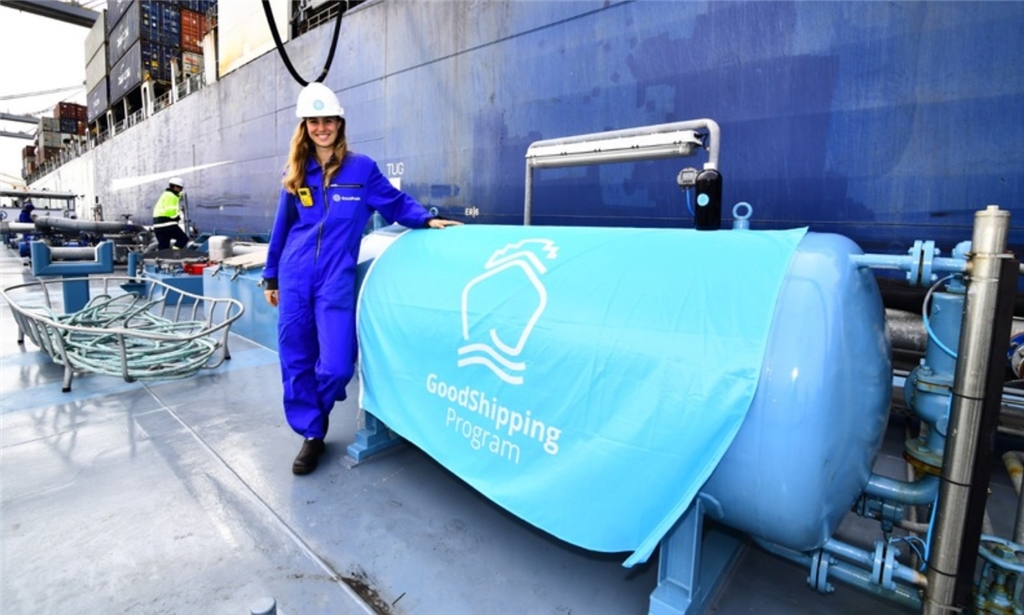IKEA Transport & Logistics Services, the CMA CGM Group, and the GoodShipping Program have today announced the successful completion of their 2019 biofuel test programme on CMA CGM vessels, following the positive trials of Heavy Fuel Oil-equivalent (HFO) Bio-Fuel Oil (GoodFuels BFO) during CMA CGM ALEXANDER VON HUMBOLDT’s North Europe-Asia trip, which occurred in September and October 2019, CMA CGM said in its news release.

This latest development follows the world premiere refuelling of a container ship with sustainable biofuel, when the CMA CGM WHITE SHARK took on the bunker during a call at the Port of Rotterdam in March 2019.
Under the unprecedented trial, sustainable Bio-Fuel Oil was used in a blend with conventional fossil-based marine fuels to power a vessel on a major oceangoing route. Both applications of the Bio-Fuel Oil showed a positive result, thus proving the technical compatibility of sustainable marine biofuels. These developments demonstrate the viability of advanced biofuels to meet current and future environmental regulations and emissions reductions targets, delivering a more sustainable shipping industry.
The Bio-Fuel Oil trialled by CMA CGM across both vessels was supplied by leading biofuels company GoodFuels, and is the first ever HFO-equivalent biofuel. All GoodFuels sustainable marine fuels are virtually SOx free and deliver 80-90% well-to-propeller CO2 reduction versus fossil equivalents.
The announcement comes at a time when the industry is under increasing scrutiny to improve its sustainability and move towards decarbonisation. With scalability, bio-fuel oil effectively future-proofs requirements for shipowners and operators to comply with future regulations on carbon reduction by 2030 and 2050.
The trials were achieved through IKEA Transport & Logistics Services’ participation in the GoodShipping Program, the world’s first decarbonisation initiative for cargo owners.
The GoodShipping Program works on the premise that, as all CO2 from shipping is emitted into the same atmosphere, the means of mitigating these emissions is equally impactful, regardless of which vessels adopt biofuels over traditional bunker fuels - or the amount of 'drop in' biofuel that is added to the fuel tank, as long as it offsets the CO2 costs of transporting participating shippers' cargo.
This flexible approach provides far greater scope for immediate impact, while having the same net effect in averting the effects of climate change.
Elisabeth Munck af Rosenschöld, Head of Sustainability, IKEA Global Transport & Logistics Services, said: “We are pleased to conclude that this pilot has been successful and that it has been proven possible to use advanced Bio-Fuel Oil on oceangoing vessels. It is only through collaboration and partnerships between major players - including cargo owners, ship operators and solution providers - that we can achieve real change at fast pace. We need a diversified portfolio of solutions to achieve our ambitious emissions reduction targets – and marine biofuels are an important part of the puzzle going forward for our sector.”
Xavier Leclercq, Vice President – CMA Ships, CMA CGM Group, said: “As a world leader in shipping and logistics, we are resolutely committed to environmental protection and the energy transition. This world premiere partnership with the GoodShipping Program and IKEA is further proof of the CMA CGM Group’s commitment to improving the sustainability of the shipping industry, and of its pioneering role in the development of innovative and environmentally-friendly solutions. These landmark trials give the maritime sector a vital demonstration into the scalability, sustainability and technical compliance of marine bio-fuel oil, confirming CMA CGM’s leading role in the energy transition of the industry.”
Dirk Kronemeijer, CEO, The GoodShipping Program said: “The success of this test programme with IKEA and CMA CGM builds further evidence of the important role that Bio-Fuel Oil will play in the marine fuel mix, and proves that initiatives already exist on the market for cargo owners to realise their decarbonisation goals. The GoodShipping Program is committed to helping more cargo owners unlock the potential of this direct decarbonisation option in the near future, as our sector continues to establish and embrace its wider carbon reduction efforts.”